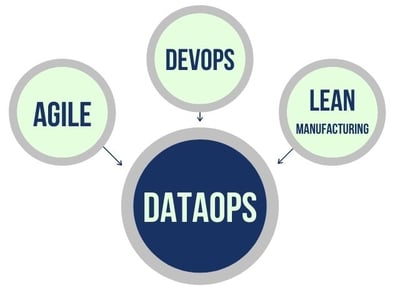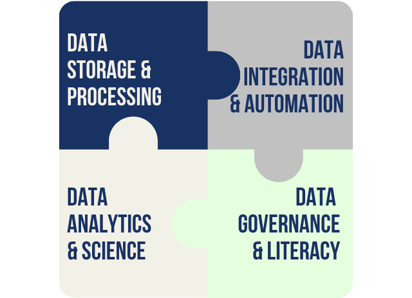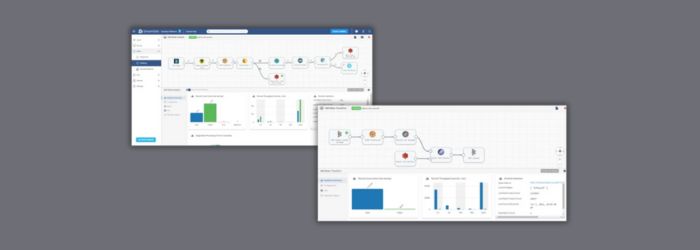If you’ve been around the data analytics world for a while, you’ve probably heard of DataOps. While the concept of DataOps may not be new, the ideology continues to solve today’s data analytics problems.

SME Solutions Group utilizes the DataOps methodology to implement DataOps services that provide advanced data solutions to our clients that transform the way they deal with data. DataOps’s meaning can vary from person to person, so in this white paper we will discuss what DataOps means to SME, and how it can transform an organization to be a data-driven and collaborative culture.
We utilize our Business Intelligence Quadrants to show how DataOps is integrated into every area of our expertise. These BI Quadrants are Data Storage and Processing, Data Integration and Automation, Data Governance and Literacy, and Data Analytics and Science.
The Origin of DevOps
 DataOps sprouts from the ideologies of DevOps, a software development methodology that intertwines software development and IT operations to create a cohesive work environment that quickens the software development process. DevOps quickly provides insights and solutions to new and changing customer needs by bringing together two traditionally siloed teams. This ideology brought the same qualities to the data analytics world with DataOps.
DataOps sprouts from the ideologies of DevOps, a software development methodology that intertwines software development and IT operations to create a cohesive work environment that quickens the software development process. DevOps quickly provides insights and solutions to new and changing customer needs by bringing together two traditionally siloed teams. This ideology brought the same qualities to the data analytics world with DataOps.
DataOps borrows from several methods, including Agile Methodology, Lean Manufacturing, and Total Quality Management, to implement automation, collaboration between departments, and data orchestration to deliver faster insights.
What is DataOps?
DataOps isn't just a single solution or magic fix for data analytics challenges; rather, it encompasses a suite of services and tools designed to transform your business's data management culture. DataOps is recognized for improving the speed and accuracy of analytics through enhanced communication, collaboration, and data literacy.
Focusing on the right mix of DataOps tools and services tailored to specific business needs shifts the focus from mere tool acquisition to solving actual business problems, ensuring that your operations can adapt quickly to the ever-evolving landscape of data analytics tools.
DataOps Services Benefits
If you are still ambivalent about how DataOps can define a business that monitors its success, let’s get into some of the benefits of DataOps.
- Reduced Cost - Improved speed of data ingestion uses fewer resources, costing less in the long run.
- Increased Efficiency - A collaborative data analytics environment helps perform reporting at a faster rate.
- Streamlined Data Orchestration and Management - From collection to processing to reporting, applications are synonymous and communicate seamlessly.
- Faster Insights – The integration of technologies like AI, cloud capabilities, and searchability increase proficiency.
- Data Quality Assurance – Data Governance enforces quality control of all data. (Link to Data Gov blog by Emily when posted)
- Parallel Collaboration –Teams can work together simultaneously without worrying about overwriting work or losing data.
How do others define DataOps?
Since the need for improved business intelligence tools has been a hot topic for businesses looking into the future, there are several impressionable ideas of what DataOps is. DataOps, while talking about the overall improvement of a company’s data analysis, can operate and look like different practices to different industries. Reading what top technology developers see DataOps as can help broaden the understanding of what it can completely do.
IBM describes DataOps as orchestrating people, processes, and technology to swiftly deliver trusted, high-quality data. Data Kitchen views DataOps as a mix of technical practices and cultural norms that foster rapid innovation and robust data delivery through efficient DataOps tools and services.
Data Kitchen sees DataOps as a collection of technical practices, workflows, cultural norms, and architectural patterns that enable rapid innovation and experimentation, delivering new insights to customers with increasing velocity, extremely high quality and very low error rates, collaboration across complex arrays of people, technology, and environments with DataOps tools and DataOps services and clear measurement, monitoring, and transparency of results.
Meanwhile, Gartner defines DataOps as a collaborative data management strategy that emphasizes improving communication and automating data flows through effective tools, usually accomplished through consultative DataOps services.
How SME Defines DataOps

SME’s definition of DataOps scopes the usage of data mining, online analytical processing, querying, reporting, and dashboard development. We section our solutions for successful business intelligence implementation into four categories, which we call the BI Quadrants. In order, they are Data Storage and Processing, Data Integration and Processing, Data Governance and Literacy, and Data Analytics and Science. Each of the four quadrants works to solve unique business problems while working towards the end goal of a data driven, collaborative DataOps culture, which is why we use the BI Quadrants as our way to define what DataOps means to us.
SME always focuses on the client's long-term end goal and aligns their use of data storage, processing, governance, and reporting to achieve that goal.
Data Storage and ProcessingData Storage and Processing is the heartbeat of Business Intelligence. In order to access your data and uncover insights, it needs to be clean, trustworthy, and relevant data that is stored in an organized and accessible place. Each business has unique storage and processing needs, whether it be cloud computing or scaling and workload management, that need to be met in order to set up the correct data environment to be able to achieve a DataOps culture. SME promotes data storage and processing solutions that result in the following business outcomes: faster, more efficient data pipelines, quicker insights, tighter collaboration, and more integrated business processes with other BUs, partners, suppliers, or customers. |
Data Integration and AutomationStriking the balance between using the most advanced tools and having a clear understanding of the desired goal is what SME communicates with our clients. As you strive to have knowledge of the data and see the importance of it, you will find that there are several approaches to being consistent with the processing and reporting of your company’s data. These tools may come and go, improve and become stale, but the practice of respecting the data should remain constant. Technologies like automation eliminate time wasted waiting for results to appear, so your company can always be driven by results and changes that happen with your business. SME’s Data Integration and Automation solutions solve common pain points like integration jobs taking too long to run, not having real-time and automated movement of data, or outdated integration systems. |
Data Governance and LiteracySome of the core elements of DataOps are collaboration and communication. While these may seem like simple concepts, they require Data Governance and Literacy to be put into place to allow each member of an organization to have the ability to easily communicate and collaborate with data. A culture of collaboration is a key to faster reporting and filtering of data within your entire company. By creating spaces where employees can discuss data and what they are finding from it, it is easier for individuals to support the data-focused enterprise. Technologies like data catalogs allow individuals to report from a truthful and governed source of data, ensuring that data silos do not occur and all information that should be present is. |
Data Analytics and ScienceWith Data Analytics and Science programs put into place, each and every employee is empowered to make data-driven decisions. SME works with data analytic programs that allow your organization to support a full range of users and use-cases across the life cycle from data to insight – self-service analytics, interactive dashboards, conversational analytics, custom and embedded analytics, mobile analytics, reporting and alerting. It’s impossible to achieve DataOps without being able to understand the data. The Data Analytics and Science quadrant provides solutions to our clients that ensure every employee can understand their data in order to make data-driven decisions. |
DatasOps Services: How SME Implements DataOps
SME has helped several clients over the years, but one of our proudest cases is helping administrative offices, 14 West.
“The SME team has been able to take me through everything from the roadmap as far as what we're trying to accomplish for 2020 but then also help identify some of the things that we are lacking. Things like process, project intake processes, things that we've done well, but there's always some room for refinement. Additionally, as we're working to roll out a lot of our analytics dashboards and get more adoption, they are able to come up with some more opportunities, things like using stories and Qlik Sense, for self-directed learnings and things like that. But I would say one of the biggest pieces, which is always a challenge when you're out there, and you're trying to come up with products for your organization that actually add value is understanding where products add value, where they really stop and what their parameters are.”
~ Michael Bresler, 14West
.png?width=700&height=127&name=Blue%20Mantis%20formerly%20known%20as%20SME%20Solutions%20Group%2c%20Inc.%20(GREEN).png)





